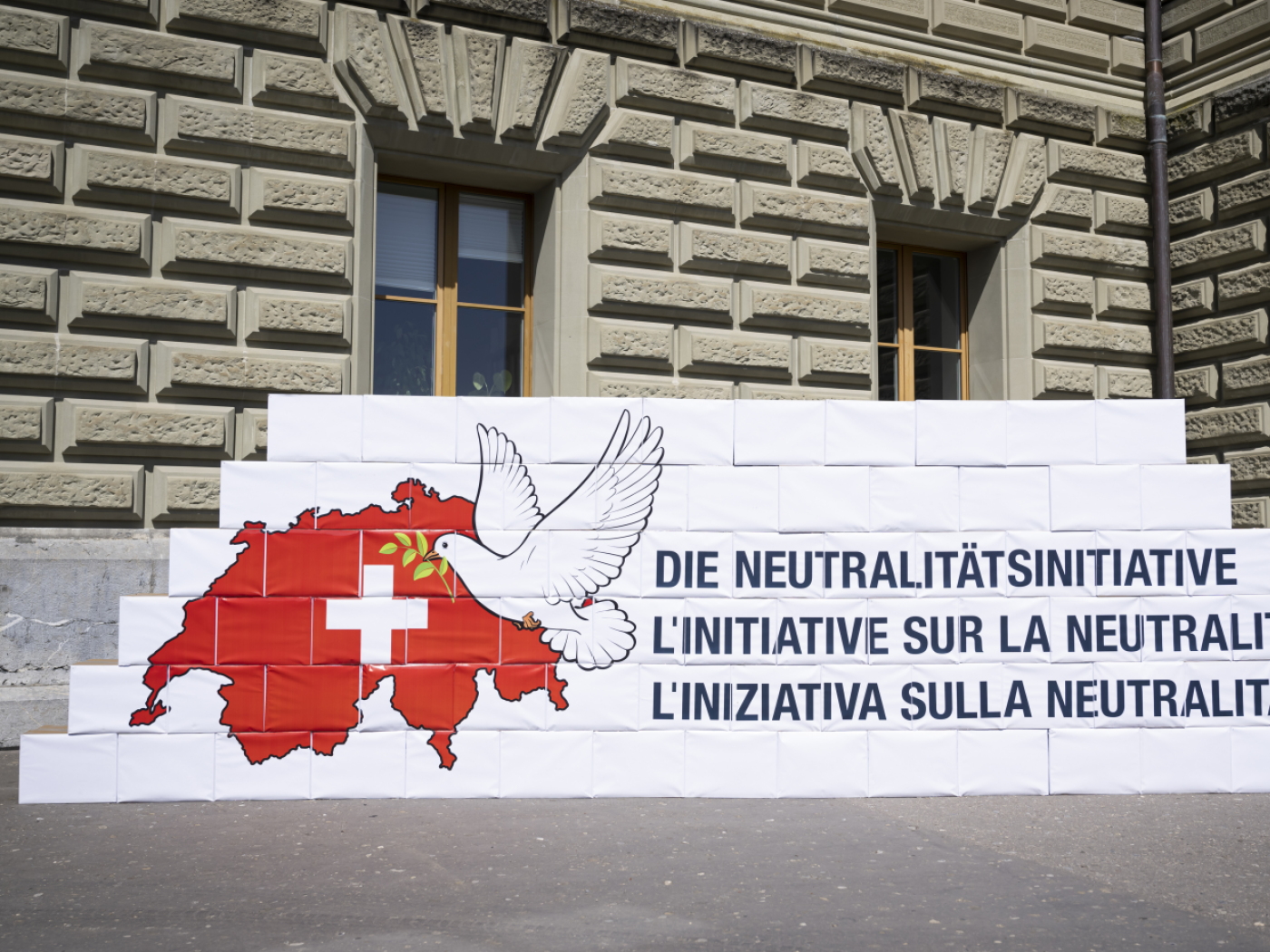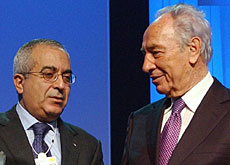
Israelis and Palestinians link arms in Davos

This year’s annual meeting of the WEF in Davos may well go down as the venue at which the Middle East peace process was relaunched.
In an interview with swissinfo, WEF acting director for the Middle East, Frédéric Sicre, talked about the prospects for peace and the roles the WEF and the Swiss government play.
The highest-level public meeting in many years between Israel and the Palestinian Authority took place on Friday and both sides reaffirmed their commitment to working together on Saturday.
Israeli and Palestinian ministers agreed that the election of a new Palestinian president, coupled with Israel’s planned withdrawal from the occupied Gaza Strip, represented possibly the best opportunity for peace for decades.
swissinfo: What role does the WEF play in the peace process?
Frédéric Sicre: The WEF started many years ago, not just in the Middle East, to act as a sort of honest broker between sides that don’t get along.
1994 in Davos saw the big “reunion” between Peres and [the then president of the Palestinian Authority] Yasser Arafat, where the final touches of the Oslo peace accords were put together.
We were asked to provide the “economic leg”, so we organised a series of summits until 1997, when there was a breakdown of the peace process. In 2003, we re-engaged the process.
The role of the forum is based on the belief that no political process can be maintained without an accompanying economic process.
Our role has been to bridge [the divide]. Being a neutral party that has the trust of all sides, we take advantage of that to bring the players together at government, business and civil society level.
swissinfo: Do you think something significant has been happening here this week?
F.S.: Yes, I do. It was our objective to help create goodwill and trust, which have broken down over so many years.
Even before Christmas, a lot of hope was already being expressed, although the Palestinian elections had not yet taken place.
So we started planning, looking also at the difficult situation that we were confronted with – on the Israeli side, you have a coalition government, while on the Palestinian side, there was not yet a government.
We decided that we had to bring all of them together on the same stage, even though they haven’t been together in public at that level in many years.
In between, there have also been a lot of bilateral meetings, meetings with CEOs and so on. We are trying to generate economic interest again, so that the business community can push the leaders to a certain extent.
swissinfo: What will be the next steps, and how will you be involved?
F.S.: We all hope that things will now go in the right direction, but we must be careful not to recreate a whole industry around the peace process.
The next step will be a meeting with [British Prime Minister] Tony Blair in London to talk about the Palestinian economy and getting things organised institutionally so the Israeli withdrawal from Gaza can be a success. We are planning related [events] at our next WEF meeting in Jordan in May.
We need to see how the situation evolves – in some cases, we can take initiatives, in others, the political forces may be such that we have to adapt.
[Hopefully], a number of our members will be involved in creating an education initiative in the West Bank and Gaza, particularly with IT companies, which have had discussions here.
swissinfo: How do you see the Swiss involvement in the peace process, particularly with regard to the Geneva Accord?
F.S.: I think the Geneva Accord was a great initiative. Of course, some of the parties had some reservations, but the great merit of the Accord – under the leadership of Calmy-Rey – is that they provide some answers to some very difficult long-term questions about final status issues.
Perhaps it is still a bit too early to pose these questions today, but we will need some kind of framework in future, as and when the parties come together and start looking at these issues.
The initiative we took here with the Gaza disengagement workshop was also something that came out of talks between the Swiss government and ourselves.
swissinfo: Do you think the Swiss, or indeed the Europeans in general, really can play much of a role overall, or is it the United States that will call the shots?
F.S.: The US administration, and even the president himself, has put its name on the line in terms of wanting to see a two-state solution materialise.
Politically, the lead is with the Americans, but the Europeans have to be involved as well.
Also, we come back to economics. We were talking this week about the qualified industrial zones that Israel has created with Jordan and, more recently, with Egypt.
The question is how soon can this now be done with the Palestinians, so that jobs can be created and goods exported. The Europeans will have a very important role here.
swissinfo: WEF founder Klaus Schwab wants to hold a WEF meeting in Bethlehem – date to be announced. Could you guess what that date might be?
F.S.: It’s still such early days. But it is true that it has been a dream of his for some time.
Indeed, some years ago, we visited the conference centre that was being built, and the hotel infrastructure, which have now been completely destroyed. We were on the verge of being able to do this, until the [latest] Intifada came about [in September 2000].
swissinfo: But you think you will see it happen?
F.S.: Oh, yes – definitely.
swissinfo-interview: Chris Lewis in Davos
Friday’s meeting brought together three Israeli deputy prime ministers and three senior Palestinian ministers.
The new Palestinian president, Mahmoud Abbas, was also due to address the WEF, but had to cancel at the last moment.
Abbas was said to be concentrating on final preparations for a summit with Israeli prime minister Sharon.

In compliance with the JTI standards
More: SWI swissinfo.ch certified by the Journalism Trust Initiative





































You can find an overview of ongoing debates with our journalists here . Please join us!
If you want to start a conversation about a topic raised in this article or want to report factual errors, email us at english@swissinfo.ch.